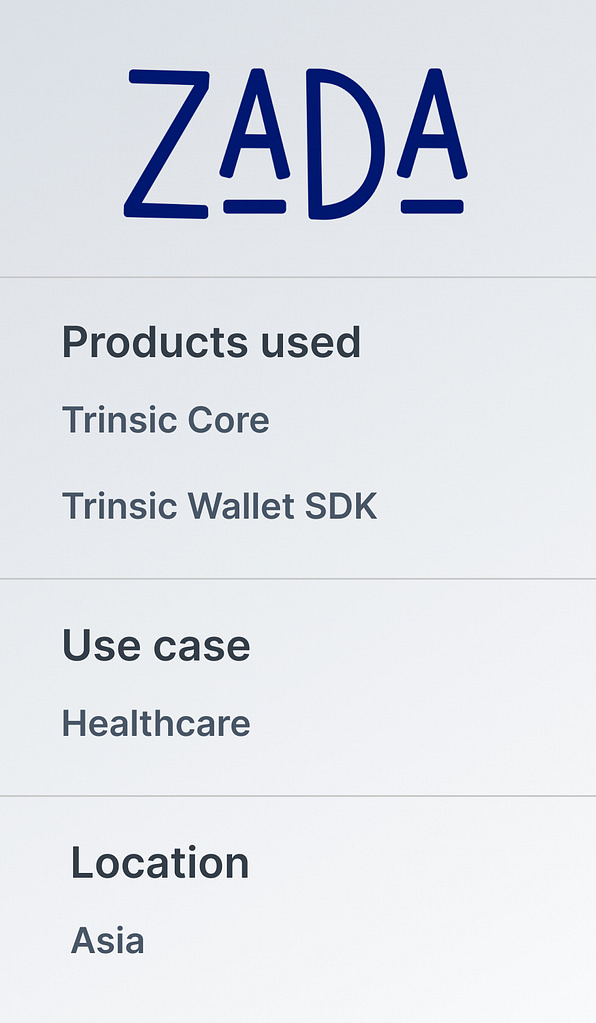Menu
ZADA uses Trinsic to enable people in Myanmar to have a digital COVID-19 vaccination card that can be shared and verified instantly.

A native of Sweden, ZADA’s Founder & CEO Andreas Sigurdsson saw how Sweden’s BankID changed how people within the country interacted with money. Using their BankID, Swedes could not only immediately send money for free to friends and family, but they could use the electronic signature on the card to open bank accounts, sign taxes, take out loans, buy cars, and more. This form of digital ID became an enabler for people to get access to online services.
Since he has spent most of his professional career in developing countries across Asia (specifically in Myanmar), Andreas wanted to create a digital ID ecosystem that not only gave people access to new digital services but also in a safe way that without risk of fraud or privacy intrusion.
With the mission to ensure that everyone has equal opportunities to benefit from new digital services and offerings, Andreas founded ZADA—a provider of digital identity ecosystems. Within the ZADA Network, organizations and individuals can securely share personal data through digital credentials. Not only can the organizations issue digital credentials of all kinds to their customers (e.g., passport, driver license, credit score, proof of employment, educational degree, etc.), but any organization within the ZADA Network can then request and instantly verify the information contained in any credential they choose.
Using the ZADA Wallet, people can interact with organizations like never before, instantly proving who they are while also protecting their privacy. All of the credentials are stored only on the device itself, giving people full control over what credentials they share and with whom.
ZADA uses Trinsic for the issuance and verification of the digital credentials in the ZADA Network. Additionally, ZADA used the Trinsic Wallet SDK to build the ZADA Wallet. Because of Trinsic use of self-sovereign identity technologies and interoperable standards such as verifiable credentials and decentralized identifiers (DIDs), the companies and people within the ZADA Network can seamlessly and securely share identity-related data where the individual’s agency and privacy are respected.

With Trinsic providing the underlying infrastructure for the ZADA Network, the ZADA Network was ready to get off the ground with real organizations and users. But what would be the first credential to kickstart the ZADA Network?
The COVID-19 pandemic emphasized the issue that people need to be able to safely and securely access services whether in-person or online. Many organizations have self-imposed or government-mandated vaccination policies for their employees and/or customers. Because of these policies, people need a way to easily share their vaccination status, and organizations need to be able to instantly verify that status. With the urgency of the COVID-19 situation, COVIDPASS became the first credential in the ZADA Network.
COVIDPASS is a verifiable COVID-19 vaccination card that can be used to easily and securely prove one’s vaccination status when needed. COVIDPASS is currently being issued by Pun Hlaing Hospitals, which is the largest hospital group in Myanmar. In only six weeks, Pun Hlaing Hospitals issued more than 25,000 COVIDPASS credentials, and ZADA expects this number to increase by 10x in the next six weeks. With the COVIDPASS credential stored in their ZADA wallet, the people of Myanmar can share it with businesses and organizations that require it.









The ZADA team expects that around 8,000 COVIDPASS credentials will be issued per day in the next couple of weeks, and that number will continue to grow. ZADA plans to support building up Myanmar’s digital ID ecosystem by offering more digital credentials other than just COVIDPASS in the near future. In addition to building up the ZADA Network in Myanmar, the team will be expanding the network to the greater Southeast Asia region and to the EU, offering COVIDPASS and other digital credentials to people in those regions.
Keep up to date with what we’re doing at Trinsic.
Sign up for our monthly newsletter.